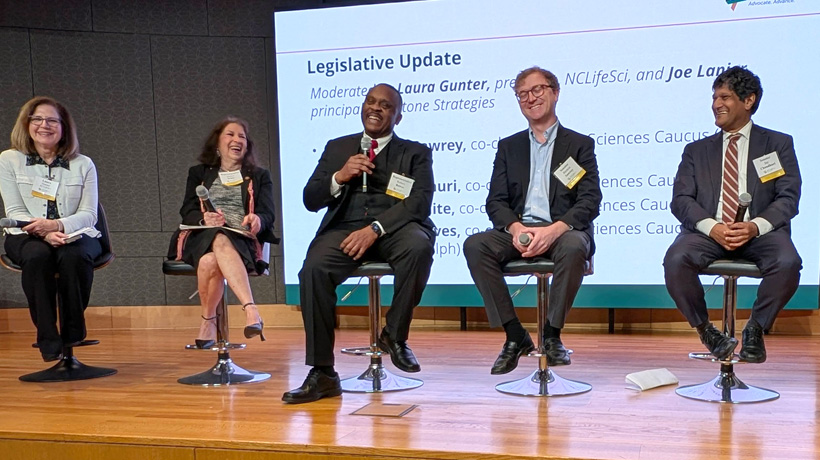NC lawmakers outline strategies for life sciences growth at forum
North Carolina legislators emphasized the need for unified industry vision and sustained advocacy as key strategies for advancing the state's life sciences sector during the NCLifeSci Legislative Forum and Luncheon held Oct. 23 at the NC Biotechnology Center.
The co-chairs of the NC General Assembly's Life Sciences Caucus outlined priorities and challenges facing the industry during the NCLifeSci Legislative Forum and Luncheon. The discussion, moderated by NCLifeSci President Laura Gunter and Joe Lanier of Milestone Strategies, focused on how the industry and government officials work together to maintain North Carolina's competitive position.
The event was sponsored by Alira Health, Lilly and Novartis.

Unified Vision Essential
Sen. Benton Sawrey (R-Johnston), Sen. Jay Chaudhuri (D-Wake), Rep. Donna White (R-Johnston) and Rep. Robert Reives (D-Chatham, Randolph) sat down with Gunter and Lanier to answer questions about collaborations between industry and government leaders.
The lawmakers stressed that presenting a clear, unified vision from the industry is critical for securing legislative support. They noted that successful initiatives require consensus among stakeholders before approaching the General Assembly, citing Medicaid expansion as an example of how diverse voices coming together to support a single goal led to passage.
The legislators warned that proposals perceived as negotiating tools between political parties risk being sidelined, regardless of merit. They urged industry representatives to bring independent voices who can advocate for initiatives based on statewide benefits rather than partisan considerations.
Economic Impact and National Security
Panel members highlighted pharmaceutical manufacturing as one of North Carolina's top exports and emphasized the sector's role in national defense and biosecurity. They noted the transformation occurring in counties like Johnston, where life sciences companies have created jobs for residents who previously had to leave the area for employment.
Lawmakers discussed recommendations from the National Security Commission on Emerging Biotechnology, which warns that China could surpass the United States in biotechnology within 10 to 15 years. The commission suggested establishing centers of excellence for biomanufacturing, and the legislators said that North Carolina is well-positioned to compete for such designations through public-private partnerships.
Budget and Innovation Funding
The ongoing budget impasse emerged as a concern affecting multiple priorities for the life sciences sector. Legislators noted that the budget contains funding for the biotech center and SBIR matching grants, programs they described as having a proven return on investment.
Panel members acknowledged tension between different approaches to innovation funding. They discussed NCInnovation and noted the importance of demonstrating how state programs benefit individual districts and translate into jobs. Some legislators advocated for increased SBIR matching funds, noting that federal research and development cuts make state support more important.
Infrastructure Challenges
The lawmakers addressed infrastructure needs related to rapid industry growth, noting that water resources present a significant challenge for pharmaceutical manufacturing expansion. For example, Eastern North Carolina is water stressed, and the Neuse River basin, which cuts diagonally across the state from Orange and Person Counties to the Pamlico Sound, is strictly regulated.
The legislators proposed finding creative approaches to infrastructure development, including allowing manufacturers to partner with local governments on water and wastewater treatment facilities. They suggested rewarding companies that invest in communities unable to independently fund major infrastructure projects, similar to existing job growth incentive programs.
Transportation funding also needs innovation, according to the panel. They discussed proposals to give local governments more flexibility to leverage transportation dollars and make decisions about road construction without depending entirely on state transportation improvement plans.
Workforce Development
Community college partnerships received attention as a model for workforce development. Legislators pointed to successful collaborations between educational institutions, economic development nonprofits and business leaders in creating training centers that serve regional needs.
The panel said that workforce development initiatives gain traction when they demonstrate benefits across multiple counties rather than single communities. Regional partnerships that show broad economic impact have better prospects for funding.
Industry Advocacy Recommendations
Lawmakers urged industry representatives to engage more actively in supporting candidates who understand the sector's importance, regardless of party affiliation. They noted that many legislators lack direct experience with the life sciences industry and need education about its economic and national security implications.
The panel encouraged bringing detailed, specific proposals well in advance of legislative sessions. They stressed that busy legislators juggling numerous issues need clear information about what the industry needs, why it matters and what return on investment the state receives.
Panel members also emphasized the importance of amplifying messages about the industry's contributions to communities. They said that elected officials who understand the sector's value need support from industry voices to help constituents recognize benefits.
Looking Forward
The legislators expressed optimism about opportunities for creative policy solutions but acknowledged that fiscal pressures at federal and state levels will require difficult decisions. They indicated willingness to work across party lines on life sciences issues and described the caucus as a productive space for bipartisan collaboration.
